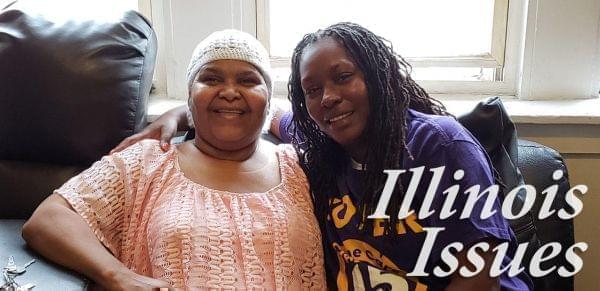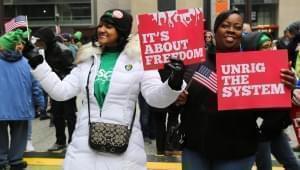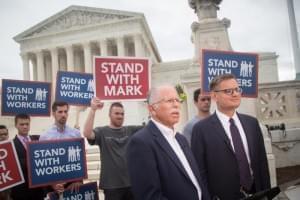Illinois Issues: The Janus Effect - Will African-American Women Pay?

Melody Benjamin works as a personal assistant for her mother Mae Benjamin. Courtesy of Melody Benjamin
Mae Benjamin has heart trouble and other ailments. She relies on a personal assistant for basics like help in showering and housekeeping - even balancing a checkbook. The assistant is her daughter, Melody Benjamin. Melody Benjamin says she, in turn, depends on her union, SEIU, for support. SEIU negotiated raises that brought Benjamin's wages up about $1.50 an hour since she started the job eight years ago.
Some experts say it is African-American women like Melody Benjamin who could bear the brunt of weakened public sector unions following Janus v. AFSCME .
The U.S. Supreme Court, deciding an Illinois-based case supported by Gov. Bruce Rauner, ruled in June that unions can't compel employees they represent to pay fees if they don't want to join and pay dues. Rauner's staff did not respond to a request for comment about this story.
African-American women face discrimination because of their race and gender. Black women make 66 cents for every dollar white men are paid, according to the Economic Policy Institute, a think tank based in Washington, D.C., whixh focuses on the financial status of low- and middle-income people. Studies show that white women earn more, as well.
Nationwide, there are 17 million public sector employees, whose ranks include teachers, police and firefighters and child support specialists like Mark Janus, the former Department of Child and Family Services employee who brought the suit. Almost 18 percent of those are African-American women. AFSCME's Council 31 represents 75,000 Illinois public service workers at all levels of government; more than half are women and a third are black, Latino or Asian.
Economist Heidi Shierholz is policy director at the Economic Policy Institute.
"To the extent that public sector union members act on their new-found ability ride to get the benefits of unionization without having to pay for the cost of those benefits, if that succeeds in hurting unions' effectiveness, that will have a disproportionate impact on black women," Shierholz said.
Ralph Martire, who is executive director of the Chicago-based Center on Tax and Budget Accountability, agrees. Both that center and the EPI have funders that include unions.

AFSCME members rally in Chicago two days before oral arguments began in the Janus case.
"Taking away union protections, particularly public employee union protections, will disproportionately cause harm to African-American women just because of the large percentage of them that do, in fact, find not just gainful employment, but even leadership-based management-based employment in the public sector," Martire said.
State Sen. Kimberly Lightford, a Maywood Democrat, says the decision further weakens the position of already economically vulnerable African-American women.
"I find that ruling to weaken the union system and therefore create undue hardship on African-American women - to allow members to opt-out of the position but still reap the benefits - weakens the support of the unions, therefore affecting the support that African-American women benefit from," Lightford said.
A September report by the Illinois Economic Policy Institute and professors from the University of Illinois and the University of California, Irvine looked at the state of unions. The authors estimate that the Janus decision will reduce the public sector union membership rate by eight percentage points. That equates to about 726,000 thousand members nationwide.
But Martire said such numbers are only conjecture.
"It could galvanize efforts of the unions to get their base more excited about not just staying a member of the union but recruiting others that are on the fence to get involved in the union to protect their rights," Martire said.
The unions themselves are not reporting diminishing numbers so far. In mid-August, an AFSME Council 31 spokesman said about a dozen members quit the union, while his organization had signed up an additional 1,000 or so. An Illinois Education Association spokeswoman said her members where invigorated by the anti-union rhetoric revolving around Janus. Since the decision, she said, less than one percent of the membership had resigned, but others were signing up at a rate of three to one.

Mark Janus (left) and his attorney Jacob Huebert, director of litigation with the Liberty Justice Center -- brief media at the steps of the U.S. Supreme Court building after Janus decision.
Benjamin, the health care assistant, is a collective bargaining and executive committee member for her local.
"We're going to get stronger and we're going to just educate our members … and let them know that they do have a voice and the work that we do is vital," Benjamin said.
But conservative groups that supported the Janus argument, like the Illinois Policy Institute, say the struggle between them and unions is about First Amendment free speech rights. The Policy Institute declined to comment on tape. Janus himself did not answer a request for comment.
Jarrett Skorup is director of communications for the Michigan-based Mackinac Center for Public Policy, which
supports so-called right-to-work laws. He says he doesn't believe the Janus decision is a negative for African-American women.
"From our standpoint, that just means that a higher percentage of American women are going to have a choice and their membership," Skorup said. "So they bear the benefits of the decision, I would say, because they can choose whether they want to continue paying dues to the union or not."
Benjamin says she refuses to be discouraged.
"We're going to continue to face these attacks,'' she said. "But we're not going to allow them to push us down."

Illinois Issues is in-depth reporting and analysis that takes you beyond the headlines to provide a deeper understanding of our state. Illinois Issues is produced by NPR Illinois in Springfield.
Links
- Illinois Issues: One Possible Answer To Teacher Shortage
- Illinois Issues: The Attorney General Race
- Illinois Issues: The People vs. The Budget
- Illinois Issues: Horse Racing Looks To Past Races To Secure Future
- Illinois Issues: Fake Weed—The Danger And The Appeal
- Illinois Issues: Birth Control Without The Doctor
- Illinois Issues: Online Learning Can Open Doors For Kids In Juvenile Jails
- Illinois Issues: Dying Young In Illinois - Black Teens Face The Greatest Risk
- Illinois Issues: For Illinois Roads, Needs Are Growing; Funding Isn’t.
- Illinois Issues: Little Soldier, Big Mystery
- Illinois Issues: Online Shopping Court Decision Brings Uncertainty
- Illinois Issues: Black Unemployment In Illinois Tops Other States
